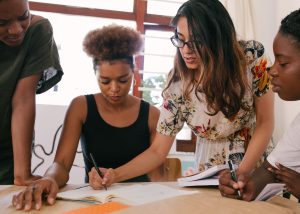
The starting point for the practice-based research we focus on is contributing to solutions to urgent problems facing society, such as global warming, loss of biodiversity and exhaustion of natural resources and people. In particular, we explore what we call ‘new entrepreneurship’: doing business in a way that contributes to human and natural values and that repairs the damage done – or better yet, prevents it.
We conduct our research with others: businesses, government agencies, organisations and (knowledge) institutes, but also associations and private individuals. When researchers and people from practice work together, we can take big strides towards a wellbeing economy. By acquiring knowledge, through research, and through the implementation of this knowledge by entrepreneurs, companies and institutions, we can genuinely make a difference in the transition to a wellbeing economy.
What is a wellbeing economy?
Currently, we still measure prosperity mainly in terms of economic growth and financial progress. The use of natural resources and people is regarded as inevitable, and we prefer not to dwell on their exhaustion and exploitation. But the earth and society are approaching their limits. For this reason, a transition to a wellbeing economy is essential.
A wellbeing economy includes everything people consider to be of value – materially and financially, but also things like education, health and a pleasant living environment. A wellbeing economy also means that everyone, now and in the future, has the opportunity to enjoy that kind of prosperity themselves. This calls for a new kind of entrepreneurship: entrepreneurship that contributes to human and natural values and seeks to prevent damage. The transition to a wellbeing economy requires new knowledge and insights and different ways of acting. With our research, we want to contribute to that.
What do we do for (and with) entrepreneurial people?
At CoE BWNO, researchers work with professors and colleagues on practice-based research that contributes to an economy of wellbeing and the associated entrepreneurship. Practice-based research starts with a relevant question from practice, which we address together with partners from the professional field, lecturers and students – not just in order to come up with a recommendation, but also to achieve significant impact and acquire knowledge. To this end, we differentiate two lines of research within our knowledge programme. The first is research into a wellbeing economy. The questions covered include:
- What do people understand by a wellbeing economy, and how does society as a whole see it?
- Does the answer to that question depend on the position of the particular individual in society?
- What do people, communities and organisations need in terms of agency in order to achieve a wellbeing economy for themselves?
- How do the entrepreneur’s values and their view of humanity translate to meaningful business practices?
- If agency is dependent on power, freedom and resources, how do we ensure a just distribution of those goods?
- What are the principles and rules of an economy that is geared towards the achievement of wellbeing and enshrines respect for nature and people, now and in the future?
The second line of research relates to new entrepreneurship. Examples of research questions include:
- How does innovation into a form of wellbeing economy take place in formal and informal organisations and partnerships?
- How does an organisation or partnership continue to create economic welfare when the focus shifts to a wellbeing economy?
- What are the principles of doing business in a wellbeing economy?
We conduct research into these questions in co-creation with professors and other researchers, businesses and institutions and lecturers and students of study programmes.
Want to get started?
Do you want to contribute to the transition to a wellbeing economy and new entrepreneurship through practice-based research? We’d love to talk to you!
Would you like to know more about our knowledge programme and research groups? Go to this web page.
